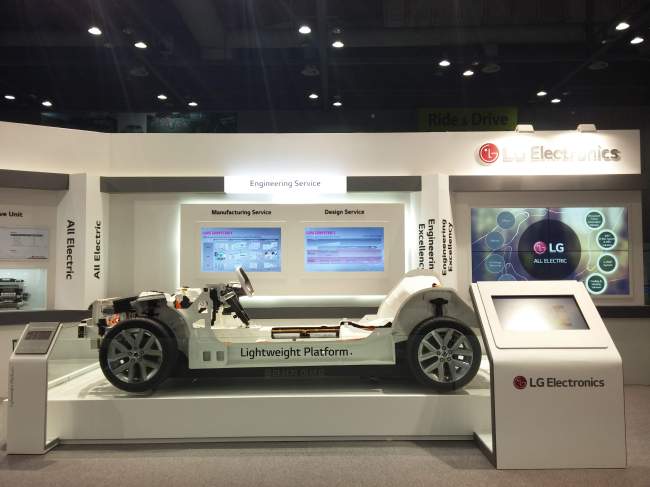LG Electronics said Monday it had won safety certification for self-driving components by Germany-based testing service provider for quality and safety, TUV Rheinland, signaling the tech firm moving further into the automobile industry.
LG said it received safety certification for advanced driver assistance and infotainment systems and vehicle display, to meet growing demand for the safety of self-driving vehicles.
This is the second time the Korean tech firm has received safety certification related to vehicles, after receiving one for electric vehicles in 2014.
 |
(LG Electronics) |
“The new safety certification will now allow us to have an edge in self-driving cars as well as electric vehicles,” said Kim Jin-yong, chief of LG Electronics’ smart business division.
This is the latest move by LG to build its presence in the vehicle market since it set up a vehicle component unit in 2013. The firm has since supplied various electric car components to global automakers, including General Motors. This year, its vehicle component unit is expected to see 3.5 trillion won ($3.2 billion) in sales, a 26 percent rise from last year.
In October, LG partnered with the US chipmaker Qualcomm to develop fifth-generation network technology for vehicles, which is necessary for the development of connected cars.
LG’s local rival, Samsung Electronics, is also stepping up efforts to develop automobile electronics technologies, although it belatedly jumped into the vehicle industry.
As part of a major push, Samsung acquired the US connected car system provider Harman for $8 billion in March. Five months later, Harman set up the strategic business unit within the firm to focus on developing safer and smarter connected cars in partnership with the Samsung Strategy and Innovation Center.
In September, Samsung also formed an Automotive Innovation Fund worth $300 million to boost its automobile electronics business. The fund will be used for securing technologies in the areas of connected cars including smart sensors, machine vision, artificial intelligence, connectivity solutions and security.
The world’s largest chipmaker may also move into the memory chip market for vehicles, which are becoming more connected and data intensive.
“Samsung will have the edge in automobile chips -- if it makes a big push -- as self-driving and connected vehicles increasingly require higher-performance memory chips,” said Lee Se-chul, an analyst at NH Investment & Securities.
Amid concerns that tech firms may face slow growth in their mainstays, including smartphones, mobile chips and displays, it is inevitable for them to seek new income sources, according to industry watchers.
“Having an edge in cameras, sensors, chips and devices, Samsung and LG are expected to further accelerate the connected car business that will rely more on tech firms,” said Dealim University automotive professor Kim Pil-soo.
“Although LG is currently in the lead in the electronic component market (compared to Samsung), it still remains to be seen who will take the initiative as both of them are still at a nascent stage in vehicle technologies,” he added.
According to the US research firm IC Insights, the global automobile electronics market is expected to reach $169.6 billion in 2021 from $135.6 billion this year on annual growth of 5.4 percent.
By Shin Ji-hye (
shinjh@heraldcorp.com)





![[Exclusive] Hyundai Mobis eyes closer ties with BYD](http://res.heraldm.com/phpwas/restmb_idxmake.php?idx=644&simg=/content/image/2024/11/25/20241125050044_0.jpg)
![[Herald Review] 'Gangnam B-Side' combines social realism with masterful suspense, performance](http://res.heraldm.com/phpwas/restmb_idxmake.php?idx=644&simg=/content/image/2024/11/25/20241125050072_0.jpg)

